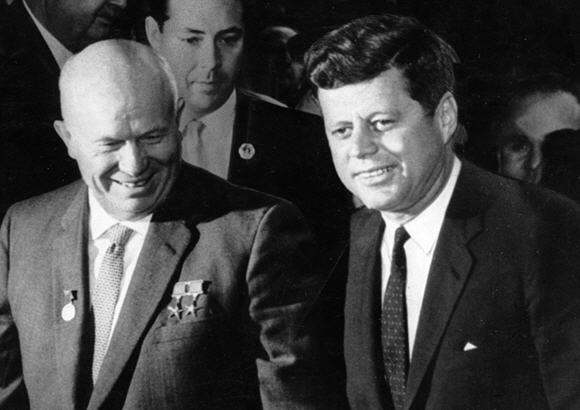
Nikita Khrushchev would celebrate his Berlin triumph at the 22nd Communist Party Congress in Moscow — and through it send the most powerful message imaginable that President John F. Kennedy had failed to create a more peaceful planet through his acquiescence to the construction of the Berlin Wall two months earlier.
Never had so many communist party leaders met in one place at the same time, nearly 5,000 in all from eighty communist and non-communist countries. For Khrushchev, the capacity crowd was intentional. He had entitled each party organization to send additional delegates to create the right theater for the message he wished to send.
Khrushchev had regained a greater hold on power during 1961 through favors, factional purges, and visits throughout the country with local party leaders. He had been able to neutralize would-be opponents as well by putting the first man in space while outmaneuvering Kennedy at their Vienna Summit and during the Berlin border closure. Time magazine wasn’t far off when it said, “In 44 years and 15 Party Congresses since the October 1917 Revolution, Communism’s inner hierarchy has never seemed more stable or more successful.”
In jocular and self-satisfied mood, Khrushchev jolted his listeners with a revelation that he would conclude successful nuclear weapons tests by detonating a hydrogen bomb by October’s end with a yield of fifty million tons of TNT. Encouraged by the cheering crowd, Khrushchev confirmed that he also had developed a hundred megaton bomb, but would not explode it “because even if we did so at the most remote site, we might knock out all of the windows.”
It was classic Khrushchev. On the final day of the Congress, the Soviet Union would detonate the most powerful nuclear weapon every to be constructed. The “Tsar Bomba,” as it would later be nicknamed in the West, had the equivalent of ten times the explosives used in the World War II bombings of Hiroshima and Nagasaki.
Again caught flat-footed, Kennedy knew that he had to respond.
Kennedy was accelerating work to finalize his own nuclear war contingency plans for Berlin, fearful that the border closure was not Moscow’s last word. Senior Pentagon official Paul Nitze had produced a document that laid out four detailed scenarios that would gradually escalate from small-scale conventional action to nuclear war.
In drafting it, Nitze had seen “permutations expanded like possible successive moves in a game of chess,” until someone suggested it would take a piece of paper the size of a horse blanket to write them all down. It was then that the group came up with an abbreviated military response plan for Berlin that they called the “Pony Blanket.”
Kennedy approved all the recommendations, to be forwarded to his NATO commander, as well as a significant, new military buildup in Europe. However, worried that Khrushchev might take military action before these new conventional forces could be in place, Kennedy opted to launch a preemptive nuclear public relations strike that would reach Khrushchev at his party congress.
Kennedy approved that a speech be given by the Defense Department’s number two official, Roswell Gilpatrick, at which he would make public previously secret details about the size, power and superiority of the U.S. nuclear arsenal. Kennedy’s intelligence was making increasingly clear the extent of American nuclear dominance, but he reckoned Khrushchev lacked similar insight into U.S. capabilities.
Gilpatrick would tell a business audience in Hot Springs, Virginia, that “our real strength in Berlin” was “a nuclear retaliatory force of such lethal power that any enemy move which brought it into play would be an act of self-destruction on his part.” The details he provided stunned his local audience and also the most important target, Nikita Khrushchev in Moscow.
Kennedy could not undo the Berlin border closure, but he was calling Khrushchev’s bluff in the highest stakes game of nuclear power imaginable.
Fred Kempe is president and CEO of the Atlantic Council. His latest book, Berlin 1961, was published May 10. This blog series originally published by Reuters.
Image: kennedy-khrushchev-cropped.jpg
